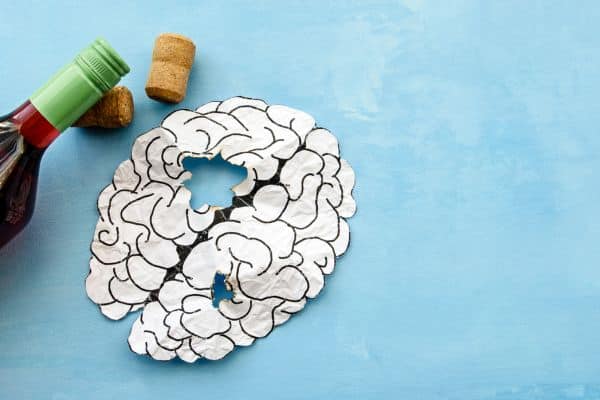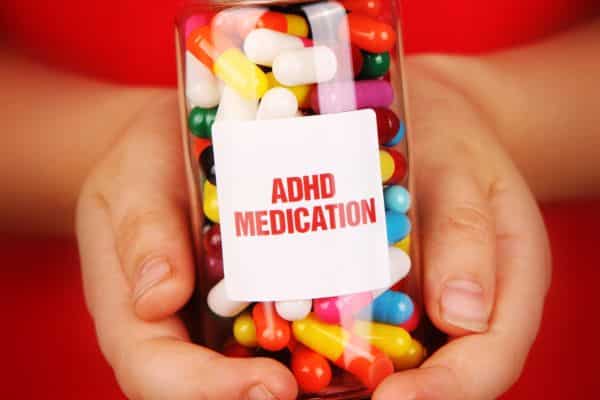There is ongoing research on the relationship between alcohol consumption and ADHD. We’re answering all your questions about how Attention Deficit Hyperactivity Disorder (ADHD) is affected by alcohol, including if alcohol makes ADHD worse.
Alcohol and ADHD have a complex relationship. While some initially seek it for calming effects, it can paradoxically worsen ADHD symptoms like impulsivity and inattention.
Chronic use can further impact focus and memory. Additionally, ADHD individuals are more susceptible to alcohol abuse due to factors like self-medication and higher vulnerability to addiction.
Remember, consult professionals for personalized advice and safer alternatives.
How Does Alcohol Affect The Brain?

Have you ever wondered how alcohol affects our brains?
National Institute on Alcohol Abuse and Alcoholism says alcohol can change how the brain functions and looks by interfering with its communication channels.
Alcohol impairs the functions of the brain regions in charge of speech, memory, balance, and judgment, increasing the risk of accidents and other unfavorable outcomes.
Chronic heavy drinking results in changes to the neurons, including shrinkage. An alcohol overdose can occur when drinking is continued. When the bloodstream is overloaded with alcohol, parts of the brain responsible for essential life support activities, including breathing, heart rate, and temperature regulation, start to malfunction.
People’s brains can undergo alterations in both structure and function as long as they continue to drink alcohol in excess. These alterations may impair brain function and cause the shift from moderate, infrequent use to heavy, uncontrollable consumption that can result in alcohol use disorder (AUD). People who suffer from mild to severe AUD may develop an alcohol addiction cycle.
What Is ADHD?
According to the Centers for Disease Control and Prevention, Attention Deficit Hyperactivity Disorder (ADHD) is a neurodevelopmental disorder that affects both children and adults.
It can interfere with day-to-day functioning and quality of life because it causes impulsivity, hyperactivity, and chronic inattention. While symptoms of ADHD can persist throughout adolescence and adulthood, the disorder is usually diagnosed in children.
There are three main subtypes of ADHD based on the predominant symptoms:
- Predominantly Inattentive: Individuals with this subtype primarily display symptoms of inattention. They may have difficulty sustaining attention, organizing tasks, and completing assignments. They may seem forgetful in daily activities and may be easily distracted.
- Predominantly Hyperactive-Impulsive: Individuals with this subtype primarily display symptoms of hyperactivity and impulsivity. They may be fidgety, talkative, and have difficulty sitting still. They may act without thinking, interrupt others, and have trouble waiting their turn.
- Combined: This subtype involves a combination of both inattentive and hyperactive-impulsive symptoms. It is the most common presentation of ADHD.
What Are Some ADHD Symptoms?
NHS notes that the ADHD symptoms can be categorized into 2 types of behavioral problems:
- inattentiveness (difficulty concentrating and focusing)
- hyperactivity and impulsiveness
Children and teenagers with ADHD typically have well-defined symptoms before the age of six. They happen in a variety of settings, including the house and the classroom. Children may exhibit signs of impulsivity, hyperactivity, and inattentiveness, or they may just exhibit signs of one of these behavioral patterns.
Here are common ADHD symptoms in children and teenagers, according to NHS:
| Inattentiveness | Hyperactivity and Impulsiveness |
| having a short attention span and being easily distracted | being unable to sit still, especially in calm or quiet surroundings |
| making careless mistakes – for example, in schoolwork | constantly fidgeting |
| appearing forgetful or losing things | being unable to concentrate on tasks |
| being unable to stick to tasks that are tedious or time-consuming | excessive physical movement |
| appearing to be unable to listen to or carry out instructions | excessive talking |
| constantly changing activity or task | being unable to wait their turn |
| having difficulty organizing tasks | acting without thinking |
| interrupting conversations | |
| little or no sense of danger |
Meanwhile, the signs of ADHD in adults are harder to pin down. This is mostly because adult ADHD patients have not received enough studies. Adults with ADHD may experience the symptoms listed below, according to some experts:
- inattention to detail and recklessness
- constantly beginning new projects before completing existing ones
- inadequate planning abilities
- incapacity to prioritize or concentrate
- prone to misplacing or losing items
- forgetfulness
- agitation and nervousness
- mood swings, irritability, and a quick temper; extreme impatience; inability to handle stress; inability to keep quiet; speaking out of turn; blurting out responses and frequently interrupting others; extreme impatience; taking risks in activities, often with little or no regard for personal safety or the safety of others – for example, driving dangerously
Since ADHD is a developmental illness, it is thought that it must have its onset in infancy before manifesting in adulthood. However, children’s and teens’ symptoms of ADHD frequently persist into adulthood.
Adults may be affected by impulsivity, hyperactivity, and inattentiveness in different ways than children. For instance, when the demands of adulthood rise, adults typically see a decline in hyperactivity but a persistence of inattentiveness. Additionally, adult ADHD symptoms are typically much more subdued than childhood ones.
What Makes ADHD Worse?

Typically, when we state that someone’s ADHD has gotten worse, we are referring to the fact that their executive functions—their capacity for self-management—have not yet matured to the point where they can perform the tasks that are required of someone their age.
A publication from Attention Magazine states that individuals prefer to label someone as being behind in their development if there is a significant gap between their abilities and those of the majority of individuals their age.
For example, it is not expected of a young child in preschool or kindergarten to be able to complete written assignments while seated at a desk. It’s not necessarily that a fourth-grader’s ADHD has gotten worse if he is constantly unable to work on that task on his own.
The issue is that, compared to what is often expected for his age, he has not made as much progress in learning how to manage the demands of greater attention and self-control.
Does Alcohol Make ADHD Worse?

ADHD is a mental health condition that affects children and teens that, if left untreated into adolescence and adulthood, can result in issues with alcohol and other drugs (AOD).
Numerous data point to the possible link between ADHD and the emergence of AOD use problems. The development of conduct issues usually comes before the onset of alcohol use or abuse; ADHD is associated with developmentally inappropriate levels of alcohol use or abuse.
The prevention and treatment of AOD use disorders may be significantly impacted by the possible involvement of ADHD in the emergence of such issues.
For instance, treatment for AOD abuse can be ineffective for those with ADHD. In order to address co-occurring ADHD and AOD use disorders, service providers working in AOD abuse treatment settings must have the necessary diagnostic and clinical skills.
How Exactly Does Alcohol Affect ADHD?

The article from Attention Magazine claims that many people with ADHD start abusing alcohol, marijuana, or other drugs excessively as a kind of self-medication.
Because of their ADHD deficits, people frequently battle on a daily basis with feelings of anger, embarrassment, disappointment, or shame. Using these drugs sometimes may, for a brief period of time, provide much-needed, if fleeting, relief from these unpleasant feelings.
The issue is in the fact that sporadic use can easily escalate into more chronic usage, which can quickly result in a recurring cycle of addiction from which recovery may be very challenging.
Addiction to these substances can exacerbate ADHD impairments in a number of areas, including social interactions, work, education, and other facets of daily life.
How Does Alcohol Affect ADHD Medication?

Alcohol usage and ADHD medication interactions are key factors to take into account for individuals with alcohol use disorders. Medication effectiveness can be impacted by alcohol, and vice versa, with potentially unanticipated results.
Here are some points to consider from Orlando Recovery Center:
ADHD is frequently treated with stimulant medications. Adderall and Vyvanse are the most widely used of these drugs. These drugs stimulate the brain, which aids in better attention and concentration in ADHD patients with the condition.
Although stimulants can be beneficial in treating ADHD, alcohol is a depressive, and stimulants have the opposite effect. Stimulants may counteract the effects of alcohol in this way, causing the person taking them to feel less drunk.
This might be risky since the user might end up consuming excessive amounts of alcohol without experiencing the negative consequences that would often result from doing so.
Furthermore, alcohol’s depressive qualities can counteract the stimulant benefits of ADHD medications.
Apart from ADHD stimulants, there are other treatments that can increase neurotransmission but do not fall under this category. The following are the most widely used non-stimulant ADHD medications:
- Clonidine
- Guanfacine
- Atomoxetine
Although these drugs usually don’t have the same side effects as stimulants, alcohol can counteract the effects of enhancement.
Alcohol can also exacerbate the negative effects of the medication, particularly the ones that make you feel exhausted and dizzy.
The Correlation Between ADHD and Alcohol
In conclusion, alcohol and other substance addictions are more likely among people with ADHD. Addiction and a mental illness co-occurring is referred to as co-occurring disorder or dual diagnosis.
Because each tends to exacerbate the other, treating both illnesses together is more challenging.
If the addiction or mental health problem is still causing issues, treating it on its own is probably not going to be effective.
An individual with ADHD is more likely to start drinking alcohol earlier in life and to drink more strongly and frequently.
Alcohol consumption, on the other hand, lowers inhibition in ADHD sufferers, making them less in control of their actions.
If you feel like you’re having trouble quitting alcohol, you can always resort to other ways like seeking professional help, surrounding yourself with a supportive network, and/or trying non-alcoholic alternatives – such as non-alcoholic beers, non-alcoholic cocktails, and dealcoholized wines.
Related Articles
ADHD and Alcohol FAQs
How does Adderall react with alcohol?
Combining Adderall with alcohol is generally not recommended. Both substances affect the central nervous system, and combining them can increase the risk of adverse effects such as dizziness, impaired judgment, and an increased risk of heart-related issues. Additionally, alcohol may counteract the therapeutic effects of Adderall.
Can you drink alcohol with ADHD medication?
It is generally advisable to avoid alcohol while taking ADHD medications, including stimulants like Adderall. Alcohol can interact with these medications and may increase the risk of side effects, reduce their effectiveness, or pose additional health risks. It’s essential to consult with a healthcare professional regarding the use of alcohol while on ADHD medication.
How does alcohol affect ADHD?
Alcohol does not treat ADHD; in fact, it can exacerbate symptoms and impair cognitive function. Individuals with ADHD may have an increased risk of developing alcohol-related issues, as they may be more prone to impulsive behavior. Long-term alcohol use can also have detrimental effects on the brain, potentially worsening existing ADHD symptoms.
Can I drink alcohol after Adderall wears off?
While there may be a time gap between the last dose of Adderall and the complete wearing off of its effects, it is still advisable to exercise caution with alcohol. The residual effects of the medication and potential lingering interactions could still be present, and drinking alcohol immediately after Adderall wears off may pose risks.
Can I have a glass of wine on ADHD medication?
While having a small amount of alcohol might not be immediately harmful for everyone, there can be individual variations in how people react to the combination. Factors such as dosage, individual response to medication, and potential interactions make it crucial to seek personalized advice from a healthcare provider before consuming alcohol while on ADHD medication.
